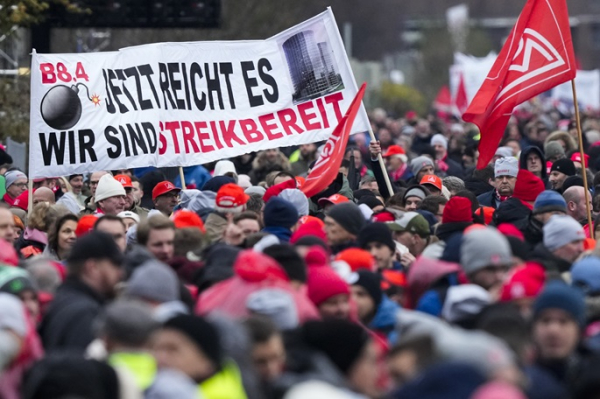
German automotive giant Volkswagen and employee representatives concluded their five-day intense talks over the company's far-reaching cost-cutting plans on Friday, reported Xinhua.
Both parties announced they have reached an agreement, with involuntary layoffs and plant closures being ruled out.
Around 70 negotiators from Volkswagen and IG Metall have convened in Hanover, a city near the carmaker's Wolfsburg headquarters, to resolve the dispute over the past week. On Friday morning, disagreements between the two sides over redundancies were highlighted, leaving the possibility of negotiation failure open.
According to their agreement on Friday evening, more than 35,000 jobs at the German sites will be cut in a socially responsible manner by the end of 2030. The remaining employees are guaranteed job security until then.
In addition, Volkswagen said that all of its 10 German plants will remain open for now, rather than being closed directly as previously announced. However, two smaller plants will cease car production.
In return for the company's softening of its cost-cutting measures, employees will forego direct wage increases through the end of the decade, with bonuses also set to be cut. The company hopes to save annual labor costs of 1.5 billion euros until 2030.
"We had three priorities in the negotiations: lowering excess capacity at the German sites, reducing labor costs and reducing development costs to a competitive level," said Volkswagen brand CEO Thomas Schaefer, emphasizing that both parties have achieved workable solutions on all three issues.
The carmaker plans to reduce technical capacity at its German plants by more than 700,000 vehicles.
German Chancellor Olaf Scholz later issued a statement praising the wage agreement as a "good and socially acceptable solution." He emphasized the significance of the compromise, saying it ensured both the company and its employees can move toward a secure future despite all the hardships.
The week-long bargaining talks, initially scheduled for just Monday and Tuesday, stretched far beyond expectations as disagreements over major issues persisted. The tough negotiations, the longest ever for the carmaker, lasted approximately 70 hours in total, extending late into the night on several occasions.
As the fifth round over weeks, the talks between Volkswagen and the IG Metall, one of Germany's most influential trade unions, followed a contentious labor dispute over the automaker's cost-cutting plans. The talks were deemed decisive as both sides sought to reach an agreement before the Christmas holiday.
Faced with declining financial performance and excess capacity at its German factories, Volkswagen proposed restructuring plans to reduce labor costs to maintain global competitiveness, which included 10-percent pay cuts, potential plant closures, and mass layoffs.
IG Metall and the Volkswagen works council attributed the company's crisis to poor management and argued that employees should not bear the brunt of these challenges. They proposed alternative solutions, such as less working hours and a freeze on wage increases, which they estimated could save about 1.5 billion euros.
Volkswagen rejected the union's proposal in earlier negotiations, in fear that such measures were insufficient to address its long-term structural issues, particularly high labor costs. Arne Meiswinkel, Volkswagen's chief negotiator, emphasized that successful operations, which could be achieved through plant closures and layoffs, were "a prerequisite for job security."
Two prior rounds of negotiations had triggered the largest strike the automaker has faced in years. Around 100,000 workers from nine of Volkswagen's 10 German plants participated in the strikes, halting production for two to four hours each time to pressure management. IG Metall warned of an escalation of strikes if no consensus was reached in the final round.
Volkswagen's predicament highlights broader challenges faced by the German automotive industry, particularly during the transition to electric vehicles. Following the wage agreement reached on Friday evening, Germany's Economy Minister Robert Habeck called for joint efforts to renew and strengthen the industry's competitiveness while accelerating the ramp-up of its e-mobility.
Dirk Grosse-Loheide, a member of Volkswagen brand's board of management, said at a summit in late November that Germany's auto industry lags behind global competitors in innovation and investment, citing high energy and labor costs as significant barriers. Additionally, he pointed to inadequate infrastructure for electric cars and bureaucratic hurdles as major hurdles for the sector.
- Volkswagen
- Job
- Cuts
Source: www.dailyfinland.fi
